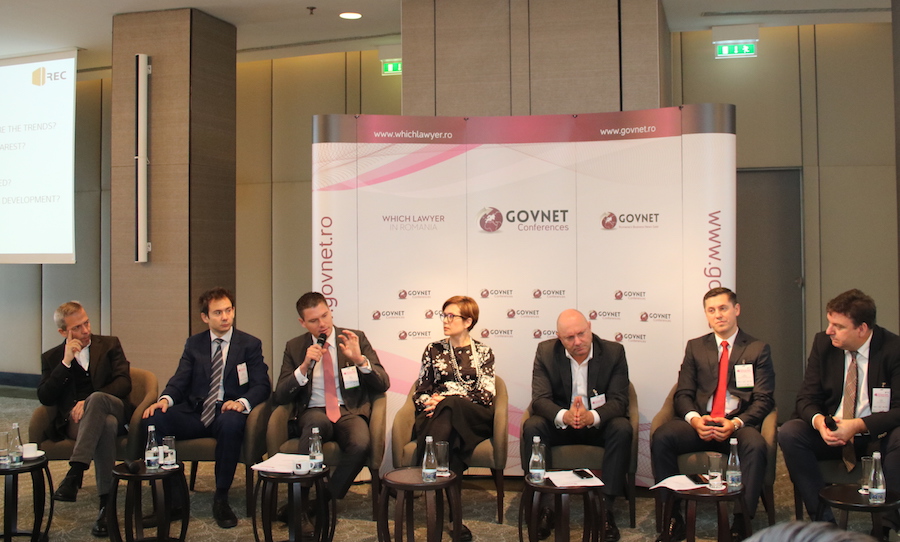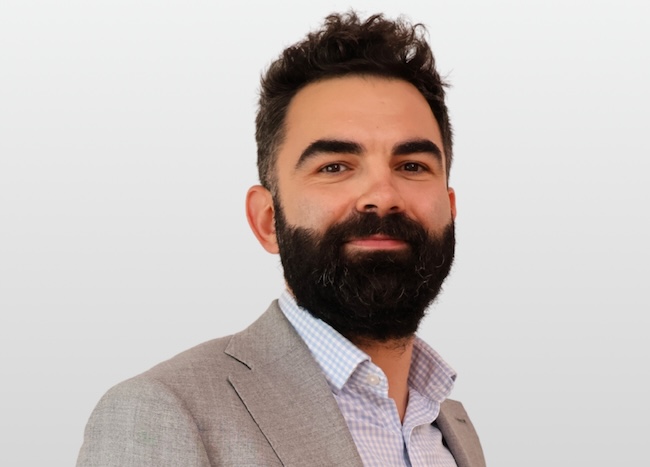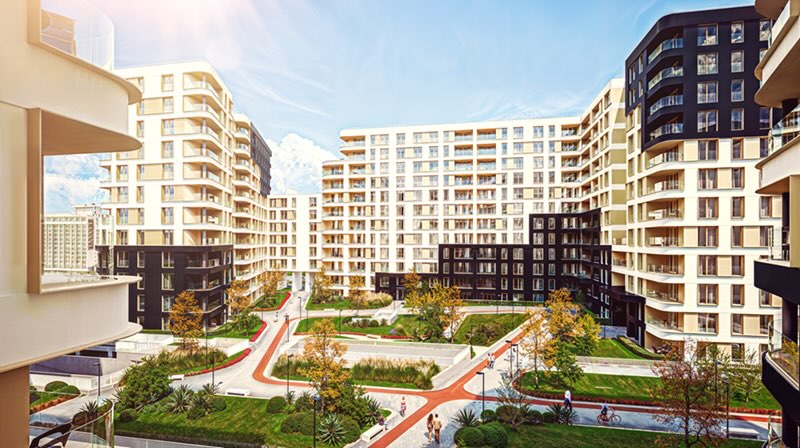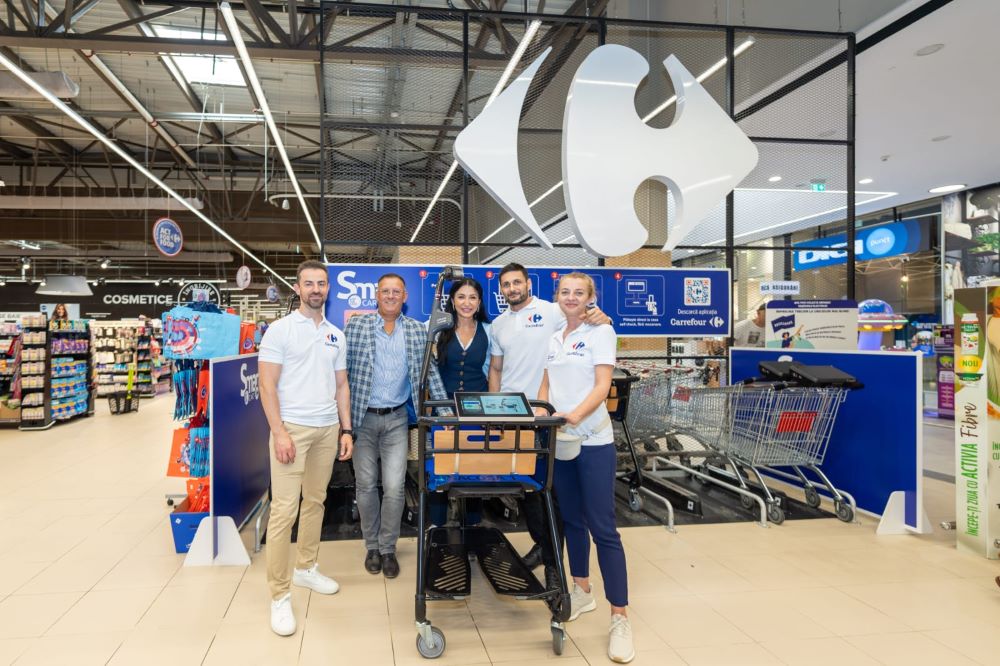The new type of mix in retail – How to transform shopping centers to attract more customers
October 27 2017

The retail market in Romania is taking full advantage of the increase in consumption, but this trend will probably not last long, representatives of the shopping centers think. They are already talking about the transformation of the retail mix by accentuating the areas that are not strictly shopping-related.
Speakers at the Romanian Retail Real Estate Forum, the 4th edition, showed the main trends in the retail market, what are the advantages of the actors in the field, but also the challenges and dangers that they may encounter in the context of the digital age and on the fund of a boom in consumption.
Tatian Diaconu, General Manager, Immochan Romania, said that the developer's job should evolve: "We need to change from an absolute shopping-oriented model, customers go where they are offered a variety of reasons, and shopping can be the last reason." The approach should be of an "urbanist": That means I do not see a project in an isolated way, focusing exclusively on the area that interests me, but we are talking about projects based on the precise and local understanding of the needs of the community, thus creating a project as close as possible to the community. Our job evolved because the company evolved. People want their cities back. People want to be able to work, live, spend quality time in friendly neighbourhoods."
One of the solutions, according to the Veranda Mall representative, is also an American model - the developer of the shopping center has to buy franchises because "sometimes you can't bring different experiences without investing in them from your own pocket." After one year of Veranda Mall's inauguration, Andrei Pogonaru has concluded that more entertainment is needed to make customers go through the shops and "meet with impulse shopping."
In this regard, refurbishment limited to a simple renovation is not enough. "Any shopping center has a life cycle, but it seems that cycles shorten, and that's a challenge. It is important to bring a local or a regional shopping center closer to what people want, including in terms of all services, even taxes and passports. In addition, the tenants' mix is important, the good position, the entertainment part, but there is much talk about energy optimization too," said Tudor Popp, Managing Director, REC Immpuls.
Sorin Blaga, General Manager, Liebrecht and wooD Romania, a company that developed and operates the Fashion House Outlet Center in Militari and which will start construction of the second such center in Cernica next year, noticed that city malls are starting to lose their relevance. In parallel there is a very low-risk business model - the outlet centers, which come from the US and which in Europe are now more than 140 units, with a very high growth rate.
"It is not online who will hit city malls, but the buying behavior. In the US going into a shopping mall becomes completely irrelevant. People want to go to open air-centers, want leisure and entertainment opportunities other than indoor. That is why the project in the east of Bucharest will be open-air type, a less visible concept in this area of Europe.
Ali Ergun Ergen, General Manager, TBE Solutions, a consultancy company in the field, believes that there is much potential in Romania, sees interest in our country even beyond the ocean. But to be competitive, second-generation shopping centers need to provide much more space for leisure and entertainment, and their developers have to look at them like living organisms that are sometimes very happy, and sometimes get sick.
That is why "logistics tends to become the new retail", said Roxana Dudau, Associate Partner at Noerr law firm, who has identified a new problem in the development of malls - that there are no big land parcels for sale, such as, for example, the Tractorul platform in Brasov. "Such investments can't be done, except with the help of the state, through a public-private partnership," added Roxana Dudau.
But for now, the state is more tangled than helping, delaying the projects. Florin Popa, General Manager of Vitalis Consulting, a company that assist developers in the construction process, said that representatives of a project in Ramnicu Valcea wanted to complete the part of the authorizations before the elections, having in mind the inconsistency of local authorities. "Developers ask us - how long does it take to obtain the building permit? And we say, from our experience - a year and a half," argues Florin Popa, mentioning that theoretically, obtaining all the authorizations should not last for more than three months.
E-commerce, threat or ally?
Another topic discussed within the Retail Real Estate Forum was how much the online influences the traditional retail.
Florinel Chis, the executive director of ARMO - the Romanian Online Shops Association, said that this year, the local online trade will exceed 2 billion euros. "For retail, e-commerce has become a must, it's an essential component for retail business. We now have to do with an omnichannel experience. I want to buy a product, I see it online, then I can go to the store to test it, maybe I can test three models, place an order online or in the store, and it is important for the customer to deliver a product in best conditions," said Florinel Chis.
Neither Serban Radu, co-founder of Carturesti, doesn't see in the online environment a threat to traditional retail. The Carturesti online store has an annual sales growth of 70-100%, but it's still not a very high percentage of the turnover. Instead, in the store people come for experience, for the well-being they know they will find there. And even if they don't buy something every time, one day they will still buy a book or a bag of tea. In addition, to bring more people to bookstores, Carturesti's representative is thinking of bringing orders placed online in the bookstore, a place where customers will probably be attracted to other books and will do other shopping.
Also, regarding the difference in sales between street and mall shops, Serban Radu admitted that "money is at the mall" and street locations are ideal for events.
Catalin Pozdarie, General Manager, Hervis Sports, has explained the current situation regarding the relationship between online and offline retail: We are in the age of the total retailer, there will be no more channels in the future, the client will transit through the physical store and the online store without any barriers. I don't have to wonder if a client prefers to go online. We are the competition, not the online environment, online must be seen as an opportunity as we can't be everywhere."
Frederic Lamy, CEO, Leroy Merlin, said that in stores, the relationship with consumers is superior to what's happening online, much more personal. "We can talk to our clients. Amazon is huge but can't do the same thing. In Romania, digitally, we are very late. We don't want to hurry, not because we don't believe in e-commerce. Our strategy is to be a different shop, not a competing shop." That's why Leroy Merlin will focus on improving customer experience inside physical stores.
For the Fru Fru brand, social media is the main channel for customer communication, mostly formed by young people from the Millennials generation, according to Bogdan Mugescu, Fru Fru Expansion Director. "We are very surprised with the way in which our new concept 'Cooperativa Fru Fru' grew up in social media - in six months we have already reached 10,000 organic fans, without giving free coffee in the store in exchange for a like," says Mugescu.
Regarding the presence of just 6 months in the Promenade Mall, Fru Fru representative said it was a lost bet, it did not work because in general, customers in shopping malls are not healthy conscious consumers. Instead, the brand will focus on the office-fresh corner format, and on a large format that will allow other local niche producers such as artisanal beer to come up with products.
Ruxandra Stoian, Key Account Manager, Philips Lighting, spoke about the mega-trends that are happening now in the retail industry - the growing importance of the Millennials generation and the growing connectivity. People are increasingly open to technology, have access to information and the Internet anytime, anywhere. At the same time, they are increasingly busy and want to solve as much as possible at the same time. So they need a motivation to go shopping - if they can solve other things in a mall, such as letting their child play or leave their clothes clean. And with the help of technology that monitor visitor activity, mall representatives can see exactly what attracts consumers and can change their marketing strategies in real time.
Mircea Isvoranu, Fruits and Vegs Manager, Carrefour Romania, spoke about a retail strategy that made fruitful results: Cooperativa Carrefour Varasti, a successful partnership with the Romanian vegetable producers in the Varasti area, led to a greater freshness of the vegetables at the shelf, the shortening of the logistics and supply chain, fewer imports, supporting the local community in centralizing and increasing production each year, and especially a better price for consumers.
Speakers at the Romanian Retail Real Estate Forum, the 4th edition, showed the main trends in the retail market, what are the advantages of the actors in the field, but also the challenges and dangers that they may encounter in the context of the digital age and on the fund of a boom in consumption.
Tatian Diaconu, General Manager, Immochan Romania, said that the developer's job should evolve: "We need to change from an absolute shopping-oriented model, customers go where they are offered a variety of reasons, and shopping can be the last reason." The approach should be of an "urbanist": That means I do not see a project in an isolated way, focusing exclusively on the area that interests me, but we are talking about projects based on the precise and local understanding of the needs of the community, thus creating a project as close as possible to the community. Our job evolved because the company evolved. People want their cities back. People want to be able to work, live, spend quality time in friendly neighbourhoods."
According to Tatian Diaconu, future projects are for people, mixed as function and perhaps more and more vertical. The project of each community should be to create a proximity, quality, self-sustaining ecosystem in which everyone can identify themselves with the community, but can also be expressed as individuality.
Also Andrei Pogonaru, CEO of Veranda Mall, talked about the lack of depth of the retail market, from the perspective of the number of retailers, referring to the US, a reference market: "In America, retailers disappear, but in Romania there are no new retailers. Although we have few retailers, they will suffer."One of the solutions, according to the Veranda Mall representative, is also an American model - the developer of the shopping center has to buy franchises because "sometimes you can't bring different experiences without investing in them from your own pocket." After one year of Veranda Mall's inauguration, Andrei Pogonaru has concluded that more entertainment is needed to make customers go through the shops and "meet with impulse shopping."
In this regard, refurbishment limited to a simple renovation is not enough. "Any shopping center has a life cycle, but it seems that cycles shorten, and that's a challenge. It is important to bring a local or a regional shopping center closer to what people want, including in terms of all services, even taxes and passports. In addition, the tenants' mix is important, the good position, the entertainment part, but there is much talk about energy optimization too," said Tudor Popp, Managing Director, REC Immpuls.
Sorin Blaga, General Manager, Liebrecht and wooD Romania, a company that developed and operates the Fashion House Outlet Center in Militari and which will start construction of the second such center in Cernica next year, noticed that city malls are starting to lose their relevance. In parallel there is a very low-risk business model - the outlet centers, which come from the US and which in Europe are now more than 140 units, with a very high growth rate.
"It is not online who will hit city malls, but the buying behavior. In the US going into a shopping mall becomes completely irrelevant. People want to go to open air-centers, want leisure and entertainment opportunities other than indoor. That is why the project in the east of Bucharest will be open-air type, a less visible concept in this area of Europe.
Ali Ergun Ergen, General Manager, TBE Solutions, a consultancy company in the field, believes that there is much potential in Romania, sees interest in our country even beyond the ocean. But to be competitive, second-generation shopping centers need to provide much more space for leisure and entertainment, and their developers have to look at them like living organisms that are sometimes very happy, and sometimes get sick.
That is why "logistics tends to become the new retail", said Roxana Dudau, Associate Partner at Noerr law firm, who has identified a new problem in the development of malls - that there are no big land parcels for sale, such as, for example, the Tractorul platform in Brasov. "Such investments can't be done, except with the help of the state, through a public-private partnership," added Roxana Dudau.
But for now, the state is more tangled than helping, delaying the projects. Florin Popa, General Manager of Vitalis Consulting, a company that assist developers in the construction process, said that representatives of a project in Ramnicu Valcea wanted to complete the part of the authorizations before the elections, having in mind the inconsistency of local authorities. "Developers ask us - how long does it take to obtain the building permit? And we say, from our experience - a year and a half," argues Florin Popa, mentioning that theoretically, obtaining all the authorizations should not last for more than three months.
E-commerce, threat or ally?
Another topic discussed within the Retail Real Estate Forum was how much the online influences the traditional retail.
Florinel Chis, the executive director of ARMO - the Romanian Online Shops Association, said that this year, the local online trade will exceed 2 billion euros. "For retail, e-commerce has become a must, it's an essential component for retail business. We now have to do with an omnichannel experience. I want to buy a product, I see it online, then I can go to the store to test it, maybe I can test three models, place an order online or in the store, and it is important for the customer to deliver a product in best conditions," said Florinel Chis.
Neither Serban Radu, co-founder of Carturesti, doesn't see in the online environment a threat to traditional retail. The Carturesti online store has an annual sales growth of 70-100%, but it's still not a very high percentage of the turnover. Instead, in the store people come for experience, for the well-being they know they will find there. And even if they don't buy something every time, one day they will still buy a book or a bag of tea. In addition, to bring more people to bookstores, Carturesti's representative is thinking of bringing orders placed online in the bookstore, a place where customers will probably be attracted to other books and will do other shopping.
Also, regarding the difference in sales between street and mall shops, Serban Radu admitted that "money is at the mall" and street locations are ideal for events.
Catalin Pozdarie, General Manager, Hervis Sports, has explained the current situation regarding the relationship between online and offline retail: We are in the age of the total retailer, there will be no more channels in the future, the client will transit through the physical store and the online store without any barriers. I don't have to wonder if a client prefers to go online. We are the competition, not the online environment, online must be seen as an opportunity as we can't be everywhere."
Frederic Lamy, CEO, Leroy Merlin, said that in stores, the relationship with consumers is superior to what's happening online, much more personal. "We can talk to our clients. Amazon is huge but can't do the same thing. In Romania, digitally, we are very late. We don't want to hurry, not because we don't believe in e-commerce. Our strategy is to be a different shop, not a competing shop." That's why Leroy Merlin will focus on improving customer experience inside physical stores.
For the Fru Fru brand, social media is the main channel for customer communication, mostly formed by young people from the Millennials generation, according to Bogdan Mugescu, Fru Fru Expansion Director. "We are very surprised with the way in which our new concept 'Cooperativa Fru Fru' grew up in social media - in six months we have already reached 10,000 organic fans, without giving free coffee in the store in exchange for a like," says Mugescu.
Regarding the presence of just 6 months in the Promenade Mall, Fru Fru representative said it was a lost bet, it did not work because in general, customers in shopping malls are not healthy conscious consumers. Instead, the brand will focus on the office-fresh corner format, and on a large format that will allow other local niche producers such as artisanal beer to come up with products.
Ruxandra Stoian, Key Account Manager, Philips Lighting, spoke about the mega-trends that are happening now in the retail industry - the growing importance of the Millennials generation and the growing connectivity. People are increasingly open to technology, have access to information and the Internet anytime, anywhere. At the same time, they are increasingly busy and want to solve as much as possible at the same time. So they need a motivation to go shopping - if they can solve other things in a mall, such as letting their child play or leave their clothes clean. And with the help of technology that monitor visitor activity, mall representatives can see exactly what attracts consumers and can change their marketing strategies in real time.
Mircea Isvoranu, Fruits and Vegs Manager, Carrefour Romania, spoke about a retail strategy that made fruitful results: Cooperativa Carrefour Varasti, a successful partnership with the Romanian vegetable producers in the Varasti area, led to a greater freshness of the vegetables at the shelf, the shortening of the logistics and supply chain, fewer imports, supporting the local community in centralizing and increasing production each year, and especially a better price for consumers.
Real estate - Latest news






